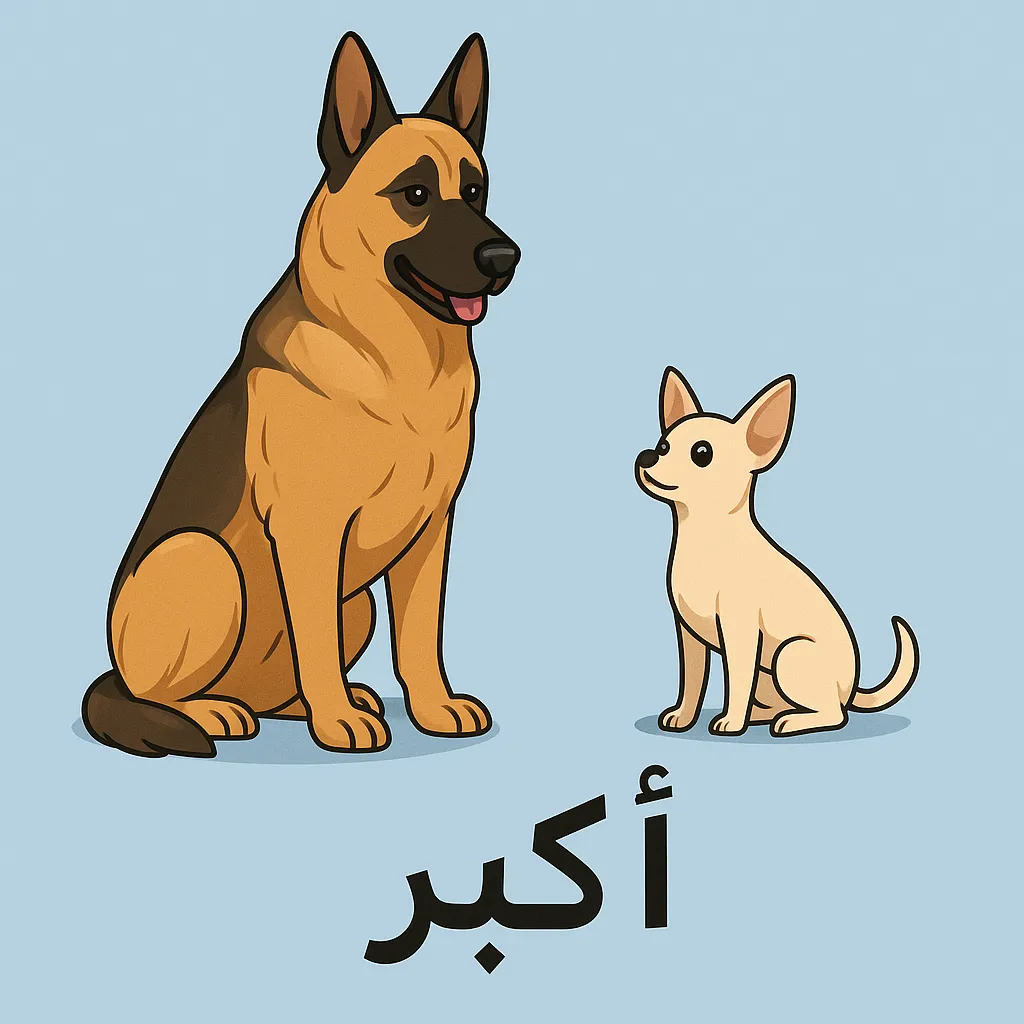
Elative Forms in Levantine Arabic
Elative Forms in Levantine Arabic
(Comparatives and Superlatives)
التفضيل بالعامية الشامية
In Levantine Arabic, like in Standard Arabic, you can compare things using elative forms—words like “bigger,” “smarter,” or “more delicious.” But unlike MSA, Levantine keeps it flexible and grounded in real-life usage.
This guide walks you through the most common patterns you'll actually hear in conversation—and the ones that are easiest to drill for fluency.
Form 1: أفعل (afʿal) — The Core Comparative/Superlative Form
This is your default go-to pattern and applies to a wide range of base adjectives.
Adjective | Elative Form | English
كبير (kbiir) | أكبر (akbar) big → bigger
فقير (faʾiir) | أفقر (afʾar) poor → poorer
جميل (jamiil) | أجمل (ajmal) pretty → prettier
سهل (sahl) | أسهل (ashal) easy → easier
صعب (ṣaʿb) | أصعب (aṣʿab) difficult → more difficult
طويل (ṭawiil) | أطول (aṭwal) tall → taller
طيّب (ṭayyib) | أطيب (aṭyab) nice → nicer
كتير (ktiir) | أكتر (aktar) much/many → more
Example:
هيدا البيت أكبر من بيتنا
hayda l-bēt akbar min bētnā – This house is bigger than ours.
Form 2: أحلى Pattern (Adjectives Ending in ـي or ـو)
Use this form when your base adjective ends in a -i or -u sound.
Adjective | Elative Form | English
حلو (ḥelw) | أحلى (aḥla) sweet/nice → sweeter
عالي (ʿaali) | أعلى (aʿla) high → higher
غالي (ghāli) | أغلى (aġla) expensive → more expensive
ذكي (zakī) | أذكى (azka) smart → smarter
Example:
المطعم الجديد أحلى من القديم
il-maṭʿam il-jdiid aḥla min il-ʾadiim – The new restaurant is nicer than the old one.
Form 3: Doubled Roots — أفعلّ (afʿall)
For adjectives with doubled middle letters, the elative forms are often just as rhythmic and intuitive.
جديد (jdeed) | أجدد (ajdad) new → newer
مهم (muhimm) | أهم (ahamm) important → more important
خفيف (khafiif) | أخف (akhaf) light → lighter
قليل (ʾaliil) | أقل (aʾall) few → fewer
لذيذ (laziiz) | ألذّ (alazz) delicious → more delicious
Example:
هيدا الموضوع أهم من غيره
hayda l-mawḍūʿ ahamm min ġayro – This topic is more important than the others.
Irregular Comparative
Some words don’t follow the usual patterns—especially the word for “better.”
Adjective Elative Form English كوَيّس (kwayyis) أحسن (aḥsan) good → better
Example:
هالشغل أحسن من اللي قبله
hal-shughl aḥsan min illi ʾablu – This job is better than the one before it.
Using Elatives in Conversation
In Levantine Arabic, forming comparatives and superlatives is simple once you learn the patterns.
Comparatives: Use Elative + من (min)
To compare two things, follow this pattern:
[Subject] + [elative adjective] + من + [comparison noun]
Examples:
السيارة أسرع من الموتسيكل
is-sayyāra asraʿ min il-mōtsēkl – The car is faster than the motorcycle.
هاني أطول مني
Hāni aṭwal minni – Hani is taller than me.
Superlatives: Use Elative + Indefinite Noun
When you’re saying someone or something is the most among a group:
هو أذكى طالب بالصف
huwwe azka ṭāleb biṣ-ṣaff – He’s the smartest student in the class.
هيدي أرخص جاكيت بالسوق
haydi arkhaṣ žakēt bis-sūʾ – This is the cheapest jacket in the market.
Or with a definite plural for “the most X of the group”:
بيروت أحلى المدن بلبنان
Bayrūt aḥla il-mudun bi-Lubnān – Beirut is the most beautiful of the cities in Lebanon.
Practice Tip
Start by drilling common elative pairs in rhythm. Focus on one point of view at a time:
أنا أطول من…
هي أحلى من…
هيدا أهم من…
Once you can say them smoothly, move on to full sentences in context.
